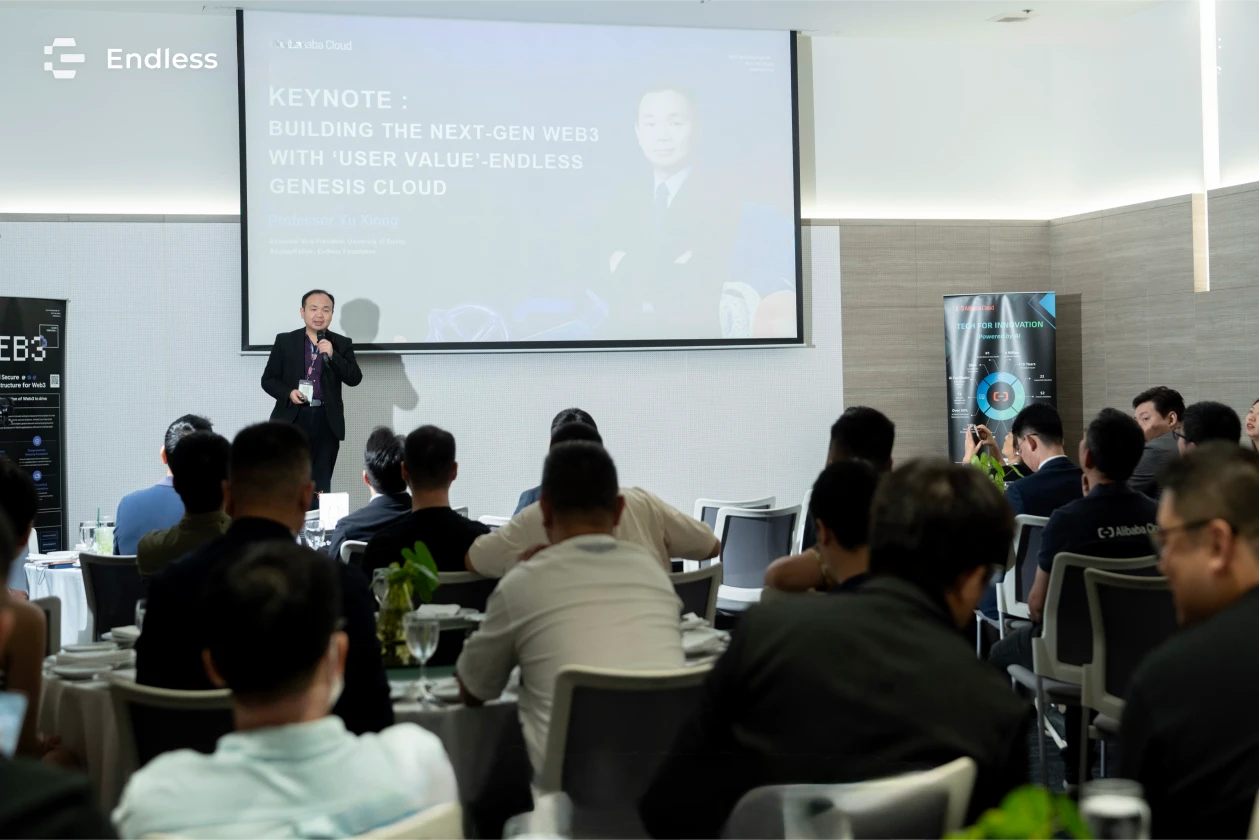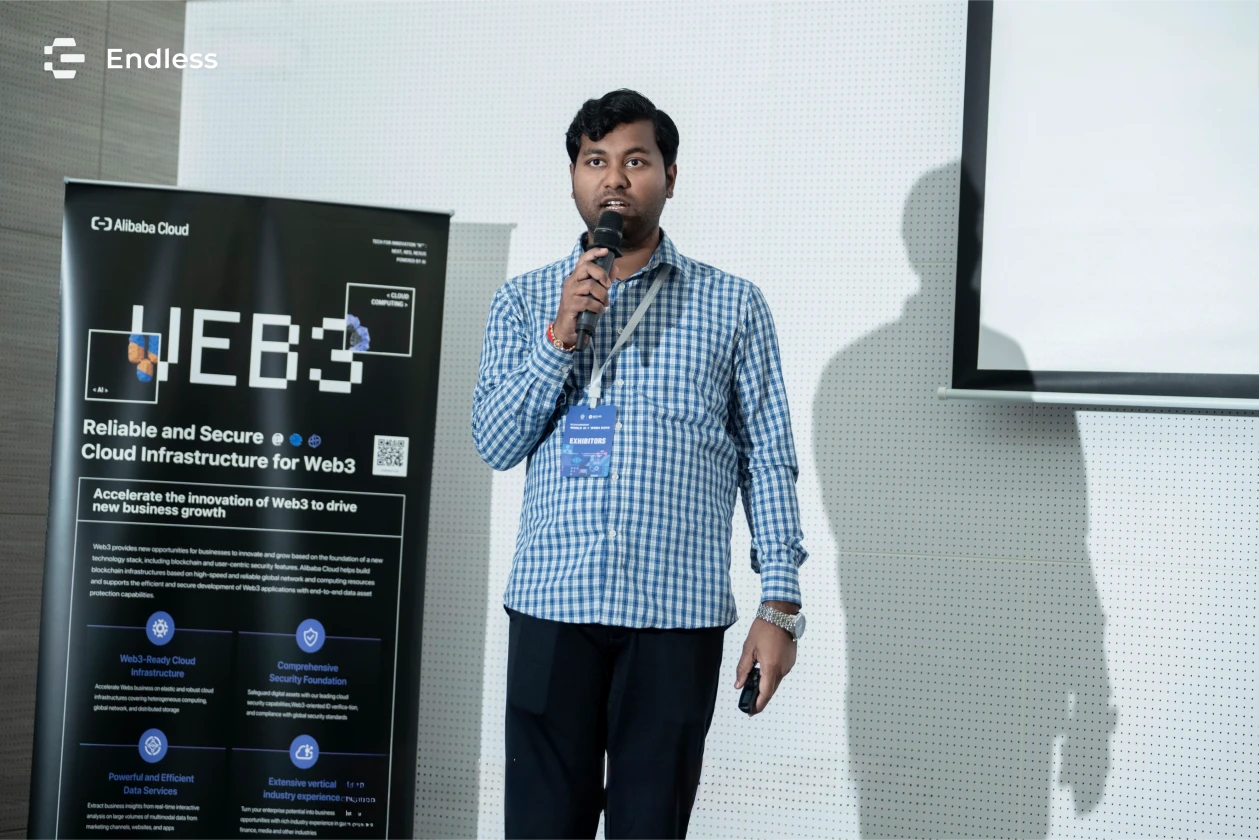On November 12, 2024, the "W2140 World AI + Web3 Expo" was grandly held in Bangkok, Thailand. This conference received joint support from nine departments of the Thai government, with attendance reaching a record of 200,000 people, making it an important event in the global Web3 and AI fields. At this conference, Alibaba Cloud, as a strategic partner, hosted the "Alibaba Cloud Web3 World Roadshow," discussing the development of Web3 infrastructure with attendees. Professor Xiong Yu, a partner at Endless, Vice President of the University of Surrey, and Director of the Blockchain and Metaverse Applications Research Institute, along with the founding team of Endless, attended as partners of Alibaba Cloud.
During the event, Professor Xiong Yu profoundly analyzed the current challenges in the Web3 industry, proposing a redefinition of the development direction of Web3, focusing on empowering developers and users, and building the next generation of Web3 infrastructure centered on user value.

Bottlenecks in Web3 Industry Development:
Looking back at the ten years of Web3 development, we can see that its core value lies in the relentless pursuit of user empowerment and decentralization.
In 2014, Gavin Wood proposed the concept of Web3, a decentralized internet that allows users to fully control their data and digital assets, laying the foundation for Web3 development and highlighting the dominant position of users in the digital world, contrasting sharply with the centralized architecture that has long dominated the web. Subsequently, in 2017, the launch of Ethereum and the ICO boom brought blockchain technology and decentralized applications into the public eye, attracting significant investment and driving a wave of innovation, marking the explosion of the Web3 concept. By 2020, the rise of decentralized finance (DeFi) and non-fungible tokens (NFTs) successfully commercialized Web3. DeFi platforms like Uniswap and Aave provided financial services without intermediaries, attracting a large number of users and investments, while the booming NFT market showcased the application potential of blockchain in digital art and collectibles. By 2021, the Web3 concept gained wider recognition, with many large tech companies and investors beginning to focus on the potential of decentralized technology. The congestion of the Ethereum network and high transaction fees spurred the development of Layer 2 solutions, further advancing the maturity of Web3 technology.
To date, the Web3 industry has been propelled into unprecedented prosperity due to the influx of financial talent and applications, achieving many milestone advancements. However, the spread of speculative behavior has not only harmed user interests but also hindered the healthy development of Web3 business models, leading to severe user attrition. Currently, the Web3 industry is facing significant challenges.
On one hand, the industry is overly reliant on speculative decentralized finance applications (DeFi), lacking sustainable business models, which has resulted in severe user attrition. The interaction between users and projects is no longer based on genuine value creation but rather on the pursuit of short-term financial gains. This phenomenon has made the interaction between users and projects superficial, lacking depth and permanence.
On the other hand, the industry's technological innovation is disconnected from actual needs, and the complex user interaction patterns of Web3 applications make it difficult for ordinary users to understand and participate in the Web3 ecosystem. To achieve widespread adoption of Web3 applications, there is an urgent need to develop more applications with practical value and enhance user experience to guide the industry towards a more sustainable direction.
The industry is at a turning point between market speculation and value applications, and only through collective efforts can a balance be found to achieve long-term healthy development.
Returning to the Original Definition of Web3:
Web3 is a decentralized network built on blockchain technology, aimed at breaking the centralized model of the current Web2 era. Its core idea is: to achieve a serverless, decentralized internet, where users control their digital identities and digital assets in the next generation of the internet. In Web2, users' activities on the web rely on large centralized platforms (such as Google, Facebook, and Amazon), which control user data and content. In contrast, Web3 hopes to enable users to directly manage their data and assets through a decentralized architecture, freeing them from the control of centralized platforms.
Professor Xiong Yu believes: we should return to the core concept of Web3, centering on users, and build a decentralized ecosystem focused on user empowerment, privacy protection, and data security. The new generation of the Web3 ecosystem will grant users complete control over their digital assets and digital identities, and encourage users to actively participate in value creation and sharing within the ecosystem through a co-creation economic model, thereby giving rise to new economic models, breaking the monopoly of centralized platforms, and promoting bottom-up innovation.
Endless Genesis Cloud:
To put the above ideas into practice, the research team from the University of Surrey, led by Professor Xiong Yu, and the Endless Foundation officially launched the next generation of Web3 infrastructure based on user value: Endless Genesis Cloud. Dr. Amit Kumar Jaiswal, as the Chief Technology Officer of Endless Genesis Cloud, introduced the platform's innovative technical architecture and unique solutions at the conference.

Endless Genesis Cloud is a distributed cloud intelligent component protocol development platform designed to provide developers with comprehensive Web3 technology empowerment solutions. The platform integrates artificial intelligence, serverless architecture, fully distributed systems, relay networks, and various SDK and API components, allowing developers to flexibly and quickly build decentralized applications (Dapps) for Web3 using any programming language. The experience of deploying applications here is similar to that of Web2 applications, significantly reducing the learning cost of mastering Web3 development technology. Endless Genesis Cloud is a decentralized cloud service platform that truly realizes user privacy protection, virtual asset security, and data sovereignty in the Web3 world. The Endless development team will soon officially release the solution and technical architecture white paper for Endless Genesis Cloud.
The ecological construction of Endless will focus on super applications, AI-native applications, and financial applications that have practical application scenarios and actual user value. Super applications refer to those with large-scale users, high concurrency, and data and traffic-driven applications, such as social media, short videos, music, and cross-border e-commerce. The Endless Genesis Cloud platform will provide guarantees for the migration of such applications to Web3.
Professor Xiong Yu stated: "Our goal is to lower the entry barrier for Web3, allowing more developers and users to participate in the co-creation of value in the digital economy, thereby promoting the formation of a more open and inclusive decentralized ecosystem."
As the world's first distributed cloud intelligent component protocol platform, Endless Genesis Cloud, with its innovative technical architecture and rich ecosystem, will promote the seamless migration of more Web2 value applications to Web3.
With the development of super applications such as privacy social, short videos, music, and cross-border e-commerce, as well as the continuous improvement of AI and financial ecosystems, Web3 is expected to transition from speculative financial tools to applications with actual value. Endless, as an important technological platform supporting this transformation, will play a significant role in promoting the large-scale application and popularization of Web3, accelerating the realization of user empowerment and value co-creation pursued by decentralized technology.
This speech attracted widespread attention and heated discussions among attendees, indicating that the challenges facing the development of the Web3 industry have garnered significant attention. Industry experts present believe that Professor Xiong Yu's in-depth analysis has pointed the way for the current development of the Web3 industry, and the series of innovative ideas and solutions proposed by the University of Surrey research team and the Endless team will have a positive impact on the industry, especially platforms like Endless Genesis Cloud that represent the next generation of Web3 infrastructure. All parties in the industry are working together to promote a more robust and sustainable future for Web3. We look forward to seeing more forward-looking innovative results emerge in the future, injecting lasting momentum into the development of the Web3 industry.
免责声明:本文章仅代表作者个人观点,不代表本平台的立场和观点。本文章仅供信息分享,不构成对任何人的任何投资建议。用户与作者之间的任何争议,与本平台无关。如网页中刊载的文章或图片涉及侵权,请提供相关的权利证明和身份证明发送邮件到support@aicoin.com,本平台相关工作人员将会进行核查。



